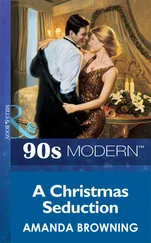“Wouldn’t you?” I retorted. “He’s either a madman or a saint.”
“You seem to be leaning toward the latter,” said Bill.
“Someone has to,” I said. “Practically everyone else thinks he’s nuts.”
There was a pause. Then Bill said carefully, “What if they’re right?”
I stiffened and thought, Et tu, Bill? “They’re not,” I said shortly. “What time is your plane arriving tomorrow?”
Bill cleared his throat. “To tell you the truth, that’s why I called….”
I listened calmly while Bill explained why he wouldn’t be coming home on Friday. Hyram Collier’s widow, it seemed, needed help settling her late husband’s estate, and Bill felt duty-bound to offer his services. I gave my blessing to his extended stay. How could I object to him helping an old friend’s widow in her time of need?
“I don’t care how long you’re away,” I told him, “as long as you’re home by Christmas Eve.”
“I’ll be home long before then,” Bill promised.
I hung up the phone, turned off the bedside lamp, and lay back against the pillows. I’d intended to speak with Aunt Dimity before turning in, but the long day had finally caught up with me. All I wanted was a hot bath, a flannel nightie, and sleep.
Moonlight streamed into the bedroom, casting long-fingered shadows across the ceiling. The shadows bucked and quivered as a biting northeast wind shook the leafless trees beyond the windowpane. I trailed my fingers across Bill’s pillow, thought of Kit’s exquisite hands, then crawled to the foot of the bed to kneel before the canvas carryall.
It seemed strangely alive in the trembling moonlight, like the crumpled body of a man struggling for breath. I touched a fingertip to a roughened seam, then slowly unzipped the zipper and slipped a hand inside. The suede pouch full of medals clinked softly as I pressed it to my lips.
“Kit,” I whispered, “why did you come here?”
11
Both Willis, Sr., and I were in pensive moods at breakfast the following morning. When I asked how the rehearsal had gone, he gave a forlorn little sigh and set his toast aside, untasted.
“It’s an amateur production,” I reminded him.
“Of that there can be no doubt whatsoever,” he declared. “The shepherds can scarcely hobble across the stage, the three wise men are being played by women, the angel of the Lord must perch precariously atop an unstable stepladder, and as for Eleanor…” He clucked his tongue sadly.
I paused with a last bite of toast halfway to my mouth. Willis, Sr., was usually full of praise for Nell Harris. I’d expected him to enjoy playing Joseph opposite her Mary. “What’s wrong with Nell?”
“Some of her ideas will have to be revised,” said Willis, Sr. “I do realize that her character is supposed to be with child, but I cannot recall a single scriptural passage describing the Holy Virgin as suffering from morning sickness.”
“Morning sickness?” I repeated.
“ Violent morning sickness,” Willis, Sr., said darkly. “Nor do I recall the Virgin toppling from her donkey in a dead faint. I was most surprised when Eleanor landed at my feet.”
“I bet she was, too.” I popped the toast into my mouth and began clearing the table, taking care to step around the twins and over an assortment of pots and pans—their second-favorite toys—on my way to the sink.
“Mrs. Bunting said nothing to me about catching a fainting virgin,” Willis, Sr., pointed out, “but then, Mrs. Bunting scarcely spoke all evening. She may be the play’s nominal director, but Mrs. Kitchen is clearly in command.” He pushed his omelet away, uneaten. “A most unfortunate turn of events, in my opinion.”
“Did Peggy give you a hard time?” I asked, knowing full well that Peggy Kitchen was constitutionally incapable of doing anything else.
“Mrs. Kitchen took issue with my American accent,” said Willis, Sr., indignantly. “When I ventured to point out that the play’s events took place nearly two thousand years ago in the Middle East and that all of our accents were therefore suspect, she told me in no uncertain terms that Joseph would speak the Queen’s English or none at all.”
I winced. As a lawyer, my father-in-law took great pride in his elocutionary skills. Peggy Kitchen had hit him where it hurt. “What did Lilian say to that?”
“Mrs. Bunting covered her face with her hands and retreated to the cloakroom,” said Willis, Sr., “where she remained for the duration of the evening. I must say that I was tempted to join her.”
I surveyed his resigned expression and felt a pang of conscience. He’d done me a big favor by filling in for Bill. I had to think of a way to cheer him up.
“Look,” I said, leaning back against the sink, “why don’t you and I corral the boys in the playpen and get to work decorating the cottage? It’ll take your mind off of Peggy Kitchen and be a nice surprise for Bill when he gets home.”
Willis, Sr., shook his head. “It is an enticing suggestion, Lori, but I must confess that I do not feel up to it.” He touched his forehead with the back of his hand. “I seem to be unusually warm, in fact. I believe I may have caught the vicar’s cold.”
It wasn’t until he spoke those words that I noticed his heightened color and a mild hoarseness in his mellow voice. Guilt stabbed me with a thousand sharpened blades. For the past three days I’d been so absorbed in Kit Smith that Willis, Sr., could have dropped dead at my feet without attracting my attention. It wasn’t good enough, not by a long shot, no matter what Julian said.
I immediately ordered Willis, Sr., into his silk pajamas, tucked him up in the master bedroom, and brought tea to him on a tray. While he sipped languidly, I called Dr. Finisterre, the semiretired physician who ministered to the local population.
The doctor arrived at the cottage a half hour later. I led him to the master bedroom, then paced the hallway, wringing my hands. My father-in-law had a heart condition. If his cold turned into pneumonia, he might end up in intensive care, like Kit, with IVs in his arms, and a bank of beeping monitors looming over him. And it would be my fault. By the time Dr. Finisterre emerged from the master bedroom, I was nearly in tears.
“His heart?” I said anxiously.
“Nothing to do with his heart,” the doctor said. “Your father-in-law has a head cold. It’s par for the course, this time of year. No need to call out the RAF.” He gave a rumbling chuckle as he descended the stairs. “I should keep him away from the twins for the time being. It’s for his benefit, not theirs. William needs rest.”
I let out a sobbing sigh and covered my mouth with my hand.
“Get hold of yourself, Lori,” Dr. Finisterre scolded. “No need to make such a fuss over a simple head cold.” He pulled on his black wool coat, placed his homburg on his head, and opened the front door. “Bed rest, fluids, and aspirin will do the trick. William’ll be right as rain in a few days.”
I thanked the doctor fervently, closed the door behind him, and leaned against it, weak-kneed with relief. From now on, I vowed, Kit Smith would take a backseat to my family. As I went upstairs to check on Willis, Sr., however, one part of my mind was still attuned to the telephone and the sound of Miss Kingsley’s voice.
I was in the kitchen the next day, laboring over a vat of homemade chicken soup and wondering why Miss Kingsley hadn’t called, when the March of the Widows began. I’d known that widows made up a large segment of Finch’s modest population, but I’d had no idea how large a segment until the eligible male in my master bedroom began sneezing. It was as if he’d issued a mating call.
Читать дальше








